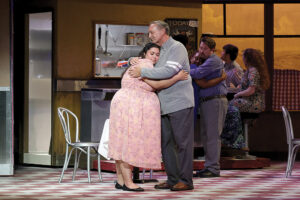A tale of two companies
8/6/2025
Playhouse debutante Hannah Zepeda leans of Playhouse legend Maxwell Shaeffer in “Waitress.” (courtesy of DMCP)
Des Moines supported the arts in record numbers this July, and not just for free stuff like Fourth of July Pops and various street festivals. We came about a new civic pride watching Des Moines Metro Opera (DMMO) and Des Moines Community Playhouse (DMCP) productions in completely full houses the same week last month. Neither company performs in a large theater, but “sold out” performances are rare for most all regional operas or community theaters. Even more impressive were the audience reactions to DMMO and “Waitress” performances.
Every time we watch an audience ovation at The Playhouse, we marvel at the depth of Des Moines’ amateur talent pool. Auditions must be delightful surprises for directors like Katy Merriman and Tristan Miedema who oversaw “Waitress.” The lead role in “Waitress” was sung brightly by Hannah Zepeda, who was making her DMCP debut after not performing since youth theater 10 years ago. Alicia Kodá Scott, who sang Becky, is a criminal justice student who also plays both ways for the Iowa Phoenix women’s semi-pro football club. Playhouse Legend (that’s a Hall of Fame by another name) Maxwell Shaeffer owned the key supporting role of Joe. His “Take It from an Old Man” brought tears to many eyes.
We have written for decades that Des Moines’ exceptional dining scene owes a lot to local publishers who have a knack for hiring talent whose spouses just happen to be great chefs. Well, Zepeda came to town for a job at Meredith. Oak Park restaurant sponsored the production, furthering the intermingled destinies of Des Moines dining and arts.
“Waitress” is a musical adaptation of Adrienne Shelly’s non-musical movie of the same name. Shelly was author, runner, director and co-star of her film, which starred Keri Russell as a young waitress dealing with an abusive husband and unwanted pregnancy in a diner specializing in the healing qualities of pie. That premiered in 2007 just after Shelly was murdered. At that time, her husband had to fight with uninterested NYC media and police just to get her death investigated as a murder. The killer was an illegal immigrant who tried to make it look like a suicide by hanging her after he strangled her.
If that tragedy happened today, media would have demanded the investigation and Shelly would be a martyr for deportation. The Playhouse production somehow made a show about spousal abuse, with a murderous history, into a joyous occasion.
DMMO mines the world’s great companies for its talent. This year, New York Times music critic Zachary Woolfe showed up and wrote fabulous things. He particularly praised the bold choices in DMMO’s repertoire. That’s been a contentious subject for most of the company’s existence. How bold can one be without alienating an audience that always buys tickets to classics faster than to experimental, modern stuff? The bold are now gaining an advantage with more sold-out crowds as game changers.
One Tuesday performance of “The Cunning Little Vixen” brought up a newer dilemma — when must the show go on? The production used computer graphics in lieu of traditional stage scenery. When the generator powering the LED graphics had an issue, the show was shut down and an unscheduled intermission ensued.
Opera spokesman Scott Arens characterized the delay as brief and momentary, but intermission was used by many fans to call baby sitters with desperate requests. Arens said that the show would have gone on had the issue not been “resolved by a quick reset.” He evaded a question about whether the presence of TV cameras was the real reason for halting the show.
August touts
“The Art of Dr. Seuss” plays Moberg Gallery through August.
“Painted & Printed: Laura Berman & Jeanine Coupe Ryding” is at Olson-Larsen Gallery through Sept. 13.
Des Moines Art Center’s best show in several years, “Firelei Báez,” continues through Sept. 21. “Iowa Artist: Ben Millet” shows quilts there through Nov. 3. ♦
















